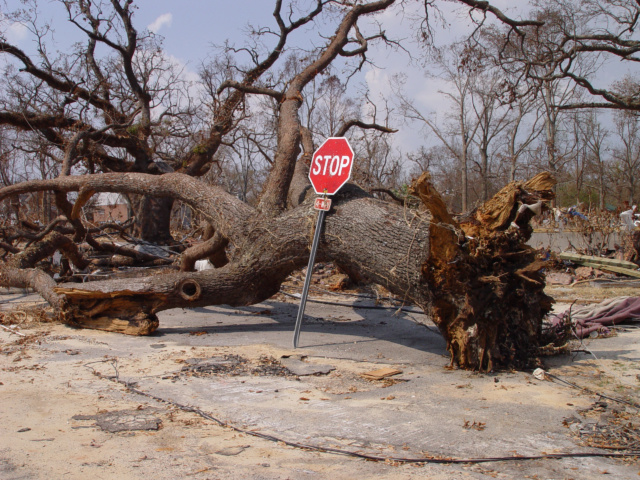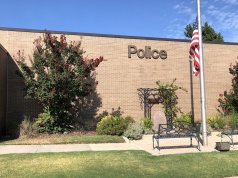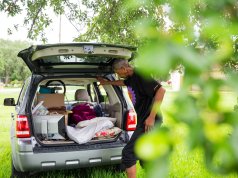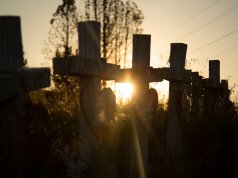At 5 p.m. on Aug. 23, 2005, the National Hurricane Center warned of a tropical depression in the Bahamas.
Six days later, Hurricane Katrina would level much of America’s Gulf Coast region within 24 hours. As the historic hurricane approached, emergency warnings encouraged people to flee north in hopes of putting a safe distance between themselves and the storm.
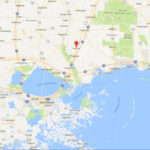
Beyond the confines of his makeshift cell, various obstacles — including nails driven through boards in the hallway outside his room and piles of lumber lashed to furniture in the living room — hindered Parker’s access to freedom. Also, the trailer’s front door had been latched shut from the outside, and a rope tied from a pole to the door knob further prevented it from being opened from the inside.
Parker found himself in this predicament through no fault of his own. Originally from the New Orleans area, his troubles had begun long before Hurricane Katrina was a blip on any radar.
An unlikely kidnapping victim
In the mid-2000s, Bonnie Mefford and Richard Hager lived in a trailer park in the New Orleans area. That’s where they met Parker, eventually befriending him and letting him move in as a roommate to share living costs in exchange for helping him get around. Things were fine for about two years, but then the abuse started.
Mefford and Hager would regularly take trips to Mississippi and leave Parker locked inside their trailer until they returned. Hager also beat Parker up on occasion. A few months before Katrina, the couple took Parker with them to relocate in Carriere, where Parker made two escape attempts. Once, he managed to climb through a window, in turn injuring himself because he couldn’t tell how far the drop was to the ground; another time, he had simply walked out the front door, only to be corralled back inside by Hager.
That’s when Hager began to employ various methods to limit Parker’s movements, including the installation of screws through the exterior window frame of Parker’s bedroom, the aforementioned nail boards and the external locks on the front door, claiming later in testimony to investigators that it was for Parker’s own good.
The night of the storm
Hager and Mefford fled to Columbia, Miss., as Katrina approached, abandoning Parker in the confines of his room with a bag of sandwiches and a meager water supply. The elder managed to ride out Katrina inside the trailer’s thin cell. On Aug. 30, he broke the bedroom window and climbed out using a sheet as a rope, cutting himself on broken glass in the process. He would spend the bulk of that day and the ensuing night wandering aimlessly around the woods surrounding the desolate property, yelling for help but receiving no reply. Everyone else was already gone.
On Aug. 31, a local man and his son who lived a few properties down were driving past the nightmarish trailer, which by now featured a crudely spray-painted sign in front warning would-be looters that they would be shot, part of Hager’s handiwork before evacuating. They saw Parker wandering aimlessly and appearing distressed, so they took him to a nearby elderly home. He relayed his story to staff there, and eventually he was taken to a hospital in Jackson, Miss.
Breaking the story
I would eventually break this story a few weeks after it transpired. My employer at the time, The Norman Transcript, had offered its staff the opportunity to go down to Picayune, Miss., and report for a sister paper owned by our parent company. Editorial staff at The Picayune Item had largely abandoned their posts or otherwise remained MIA after Katrina, but the paper was still churning out useful articles about supply drops and relief events. In fact, the Item only missed one day of publication during the tumultuous period.
With no obligations holding me back, I jumped at the opportunity, and soon was driving to the decimated region with sloshing gas cans in the trunk and extra toilet paper (at the insistence of then-managing editor Andy Rieger).
By the time I heard about Parker’s plight from staff at the local nursing home, investigators were already arranging warrants to search Hager’s trailer. I contacted them to inquire about the case, and they asked if I could delay publication since the investigation was ongoing. They didn’t want to alert the suspects that they were wanted.
When the story finally did come out, it made the Associated Press wire service and eventually found its way to the scrolling news ticker at the bottom of 24-hour TV news channels, which I noticed while enjoying a po’ boy in a random Cajun diner on my way back to Oklahoma. The suspects in the Parker case were apprehended two days after the story broke.
In May 2007, Hager was sentenced to 30 years with 10 suspended for kidnapping, and his conviction was upheld on appeal in 2008. Mefford was reported to stand trial in 2007, but searches on the Mississippi Department of Corrections website return no results for her name as either an inmate nor a parolee.
An invigorating experience
During much of the fall in Picayune 2005, the newspaper served as the only means by which residents could get information about what was happening around them. Telecommunications lines and cellular towers were ravaged in Katrina’s wake, so internet and much of phone communications were impossible. With the humble newspaper now shouldering all of the burden for local information, I had a realization of how reporters could be a force for good in the world beyond merely rehashing press releases or spouting opinions on the day’s latest topics.
The time I spent reporting in post-Katrina Mississippi marked a turning point in my career as a journalist. Whereas I had previously covered the entertainment beat almost exclusively, this taste of crime reporting in a disaster scenario and the sense of satisfaction in helping (in some small way, perhaps) to bring criminals to justice renewed my interest in journalism and drove me to obtain a master’s degree in the field.
Now, with parts of Louisiana facing the worst flooding since 2012’s Hurricane Sandy, Katrina’s anniversary seems especially poignant.
How coincidental that, 11 years after that historic hurricane and my first foray into hard news, this ambitious site will reach its own one-year anniversary.









